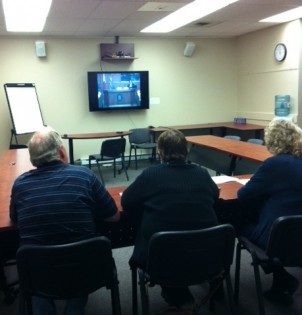City Needs Mental Health Advocate
A young man rents a basement apartment. When his landlord finds out ‘William’ has schizophrenia, he’s evicted. He bounces from couch to couch, before he ends up on the streets. William tries to keep up with his meds, but he doesn’t have a routine and one of his pill bottles is stolen. Before long, he’s very ill and a shopkeeper phones police out of concern. The young man spends a month in the psychiatric ward, followed by three months in supported housing before he’s once again able to maintain his own apartment.
– PGMHCC Chair Pennie-Lynn Davidson
Prince George, BC – While William’s story is hypothetical, the Prince George Mental Health Consumer Council says it is by no means far-fetched or unusual, and underscores the need for an independent mental health advocate in our city.

Prince George Mental Health Consumer Council members present to Select Standing Committee on Finance
As part of the provincial government’s 2016 budget consultations, PGMHCC members presented their case for $200-thousand dollars in funding to the Select Standing Committee on Finance via video-conferencing yesterday afternoon. While the ‘ask’ sounds like a lot, the local council says early intervention by an advocate could re-coup hundreds of thousands of dollars in spending on mental health care and associated costs.
In response to questioning from MLAs Mike Morris and Spencer Chandra Herbert, Council Chair Pennie-Lynn Davidson said the money would provide the city with a full-time advocate, office space, a part-time assistant and travel costs.
With one in five British Columbians suffering from mental health issues, Davidson said it’s an area that consumes a lot of government resources and the need to ensure those resources are well spent is imperative. Equally important, said Davidson, is the need to ensure the voices of mental health consumers are being heard in their care.
She pointed to the recent successful launch of a program in the Prince George area as an example of how knowledgeable intervention can save time and money…
The Car 67 program, modeled after similar programs in the Lower Mainland, pairs trained RCMP officers with psychiatric nurses to respond to calls in the city involving individuals with mental health issues. Northern Health’s Chief Operating Officer, Michael McMillan, highlighted the program’s effectiveness to City Council on Monday evening, saying when Car 67 is on, there are significantly fewer people transported by RCMP to UNHBC’s Emergency Department. And when they are taken to hospital, it’s the right call – they’re now more likely to be admitted for care (90-percent admission rate, as opposed to 50-percent pre-Car 67).
“Unfortunately, not every business or government agency has the opportunity to have a mental health-trained employee available,” Davidson told the Select Standing Committee.
“Some areas where an independent advocate would have a large beneficial impact include helping individuals with mental illness navigate the provincial disability system, obtain appropriate housing, meet with doctors and mental health care teams, or participate in Review Panel Hearings (to assess whether they should continue to be admitted to hospital under the Mental Health Act), to name a few.”

PGMHCC members Craig Norton, Sandy Ramsay, and Chair Pennie-Lynn Davidson
Speaking to 250 News after the group’s presentation, Davidson admitted there may be concern among local agencies that, with a limited provincial ‘purse’, dollars directed towards an independent advocate could result in their budgets being trimmed.
“We did have one organization talking about how another agency wouldn’t refer people to their program because ‘you’re poaching our clients’,” Davidson agreed. “So people are afraid, I think, that it’s going to be adversarial – pitting agencies against one another – but that’s not what we’re looking at, at all.”
The local council sent out an information package to more than 30 different potential stakeholders in May – groups like the BC Schizophrenia Society, Northern Health Authority, Salvation Army, and Native Friendship Centre – and did not receive a single response. “No one is interested in pursuing the idea of a mental health advocate that would be outside of their control,” said Davidson. “That is the very reason why an independent advocate is so important.”
“This advocate must exist outside the normal chain of health funding in order to do his or her job well, free of the shackles of conflict of interest.”
Back to William…
Davidson said in that hypothetical case, one or two hours of an advocate’s time, meeting with his landlord, could have prevented a six-month ordeal for the young man and saved the provincial government a bill that reached well into six figures.
“In addition to all of the advantages you’re going to see in health, wellness, and how people feel in having their voices heard (with an advocate), I think you’re going to realize much, much greater savings than the bit that’s being paid out.”

Comments
“The local council sent out an information package to more than 30 different potential stakeholders in May – groups like the BC Schizophrenia Society, Northern Health Authority, Salvation Army, and Native Friendship Centre – and did not receive a single response.“
Not a single reply? How much time and effort does it take to make a quick polite reply? Ten minutes for an email. Obviously too much! Sign of the times we live in.
Comments for this article are closed.